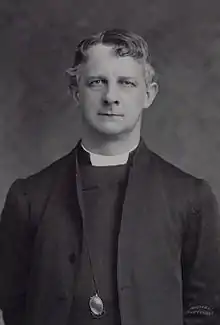Francis Jayne
Francis John Jayne (1 January 1845 – 23 August 1921) was a British bishop and academic.
Francis Jayne | |
|---|---|
| Bishop of Chester | |
 | |
| Diocese | Diocese of Chester |
| In office | 1889–1919 |
| Predecessor | William Stubbs |
| Successor | Luke Paget |
| Personal details | |
| Born | 1 January 1845 Pant-y-beiliau, Llanelli |
| Died | 23 August 1921 (aged 76) Oswestry, Shropshire |
| Buried | Bowdon, Cheshire |
| Nationality | British |
| Denomination | Anglican |
| Spouse | Emily Garland |
| Education | Rugby School |
| Alma mater | Wadham College, Oxford |
Born in Pant-y-beiliau, Llanelli, Jayne was the eldest son of John Jayne, a colliery owner and his second wife, Elisabeth Haines.[1] He was educated at Rugby School and Wadham College, Oxford. He took his B.A. in 1868 and M.A. in 1870. He was elected Fellow of Jesus College, Oxford in 1868 and tutor of Keble College in 1871.[1][2] He was ordained deacon and priest in 1870.[2]
From 1879 to 1886, Jayne was Principal of St David's College, a university institution in the small Welsh town of Lampeter. During his time there, he steered the institution through the difficult years following the 1880 Aberdare report on intermediate and higher education in Wales. The report recommended that the Colleges at Aberystwyth and Lampeter be united to form one institution, but Jayne fought the plan and retained St. David's College's independence. Jayne reformed the college in many ways; new statutes were issued and affiliation to Oxford and Cambridge was achieved. A new hall of residence was constructed and the college chapel was rebuilt.[1] The number of students doubled.[3] The college school opened in 1884, with the aim of providing a sound education for future entrants to the college.[1] Jayne is remembered as the 'second founder' of the college.[1]
A devoutly religious man, Jayne left Lampeter to become an Anglican vicar in Leeds. He became Bishop of Chester in 1889, a position he held for the next thirty years. At the time of his appointment, he was the youngest English bishop.[4] Under his rule, his diocese was said to be 'perhaps the most peaceful and orderly in England.'[4] He resigned his bishopric in April 1919 owing to ill health caused by over work.[4] He died at his home at The Quarry, Oswestry, and was buried at Bowdon, Cheshire.[5]
Jayne was concerned about excessive drinking and the misuse of alcohol. He published an article called Successful Public-House Reform[6] discussing the virtues of the Scandinavian Gothenburg system for managing pubs etc. He also founded the People's Refreshment House Association Limited which at its peak owned 130 inns and hotels.[1]
He and his wife Emily (née Garland) had six sons and three daughters,[1] one of whom was the Norwegian-to-English translator Edith M. G. Jayne.[7]
References
| Wikimedia Commons has media related to Francis John Jayne. |
- Price, D. T. W (January 2007). "Jayne, Francis John (1845–1921)". Oxford Dictionary of National Biography (online edition, subscription access). Oxford University Press. Retrieved 11 February 2008.
- "JAYNE, FRANCIS JOHN (1845 - 1921), bishop | Dictionary of Welsh Biography". biography.wales. Retrieved 25 March 2020.
- "Death of Bishop Jayne". Times. 25 August 1921.
- "Bishop Jayne". The Telegraph. 25 August 1921.
- "The Right Rev. Francis John Jayne". Aberdeen Journal. British Newspaper Archive. 25 August 1921.
- Francis John Jayne, 'Successful Public-House Reform' in The North American Review 158, no. 450 (1894): 520-28
- 'The Late Miss Jayne' in the Chester Chronicle, 20 January 1945, p8
| Academic offices | ||
|---|---|---|
| Preceded by Llewelyn Lewellin |
Principal of St David's College 1879–1886 |
Succeeded by Herbert Ryle |
| Church of England titles | ||
| Preceded by William Stubbs |
Bishop of Chester 1889–1919 |
Succeeded by Luke Paget |
| Professional and academic associations | ||
| Preceded by William Stubbs |
President of the Historic Society of Lancashire and Cheshire 1889–1903 |
Succeeded by Frederick, 16th Earl of Derby |
]
